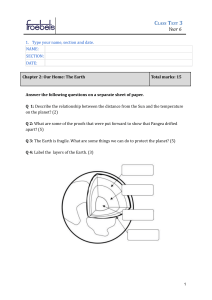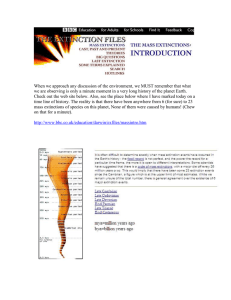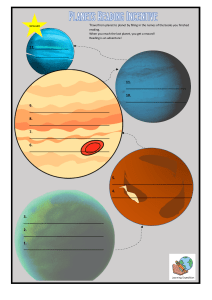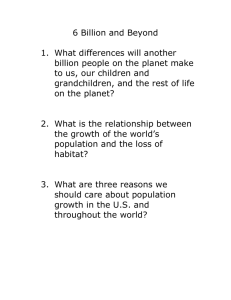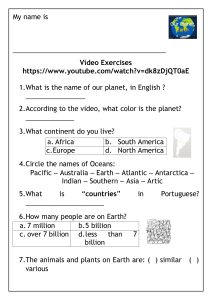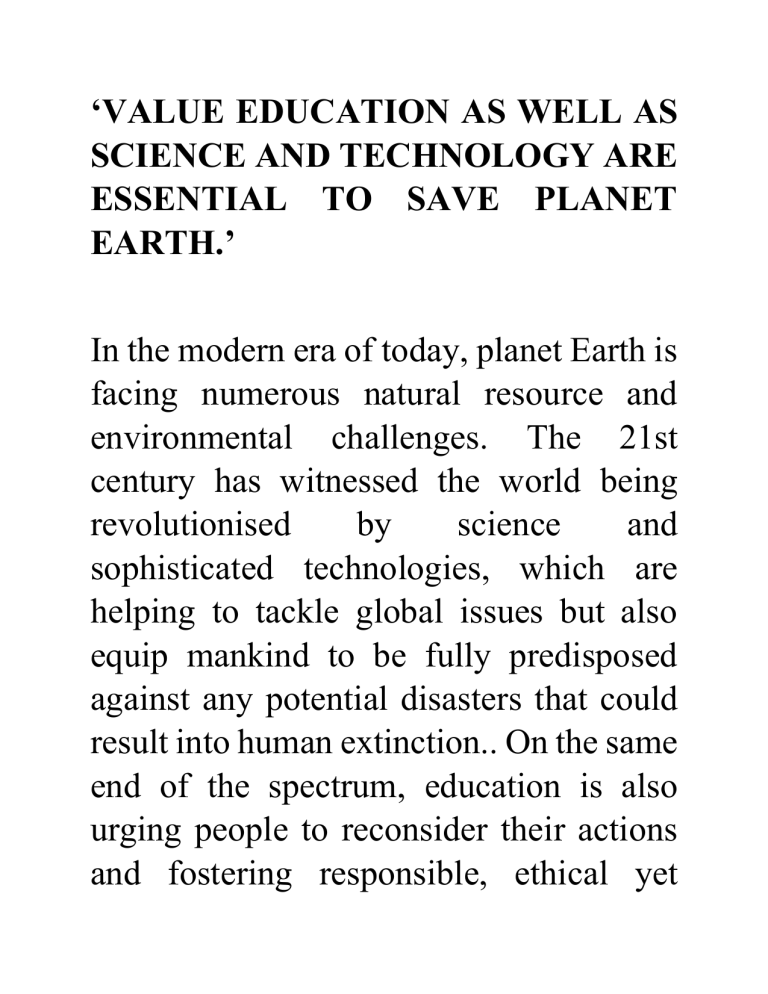
‘VALUE EDUCATION AS WELL AS SCIENCE AND TECHNOLOGY ARE ESSENTIAL TO SAVE PLANET EARTH.’ In the modern era of today, planet Earth is facing numerous natural resource and environmental challenges. The 21st century has witnessed the world being revolutionised by science and sophisticated technologies, which are helping to tackle global issues but also equip mankind to be fully predisposed against any potential disasters that could result into human extinction.. On the same end of the spectrum, education is also urging people to reconsider their actions and fostering responsible, ethical yet rational behaviour to help save mother nature from the verge of destruction. Education along with science and technology are indeed mutually prerequisite in saving our planet. This essay will put forward the worth of both of these domain in helping the blue planet. First and foremost, galactic exploration provides a better comprehension of how to protect our planet and the environment. Through astronomy and space exploration, astronauts have witnessed the world changing firsthand such as the significant shrinking of the Aral Sea ( A series of images taken from the Moderate Resolution Imaging Spectroradiometer (MODIS) on NASA’s Terra satellite documents the changes,leading to its human awareness) and the sharp decline in the Arctic sea ice extent. Satellites provide crucial data about how our planet is changing. This information is invaluable to advance cutting-edge science, make climate projections and develop innovative solutions and services to mitigate or better adapt to the impacts of climate change. Satellites can be used to monitor signs of climate change, study air, water and soil pollution and promote the preservation of land and natural resources to protect our ecosystems and all forms of life on Earth. For instance, the thinning of the ozone layer was discovered through satellites, and governments worldwide took action by signing the Montreal Protocol to protect the ozone layer and tackle climate change. Satellites can also locate oil spills and areas that have been contaminated by mining activities; consequently, the damage can be quickly contained and mitigated. SCISAT measures more than 40 different atmospheric gases. It is used to observe depletion of the ozone layer and to more effectively monitor developments in climate change, air quality and pollution. SCISAT data are used to develop international environmental policies to protect the ozone layer by banning chlorofluorocarbons (CFCs). certain Besides, the science of spirituality proves to be an effective tool in solving global issues our planet is facing today. It is only through the science of meditation one can transform his subconscious and ignorant mind. Performing duties in devotion purifies one's mind and heightens one's spiritual consciousness. Meditation trains the mind to act responsibly, ethically and yet creating a mindful attention to our habits. Its practice guides followers towards the right path by fostering empathy, self-awareness and innovative solutions, eventually promoting environmental preservation by triggering a global mind transformation. The power of spiritual influence is a potential implement to disseminate the notion of environmental ethics in the ignorant's mind. Education equally saves our planet. Nelson Mandela once said that ‘education is the most powerful weapon with which you can change the world.’ And powerful it is, in creating a more sustainable planet and pushing for social change – both of which contribute to make the world a better place. Education is also able to effect social change by equipping youth with knowledge and galvanising them into action for the good of society. It empowers citizens to hold authorities accountable and demand their rights when necessary. Individually, education teaches students to analyse a problem and tap on available resources to solve it. It is for this reason that education induces environmental change through increased awareness and fostering a sense of responsibility for nature. Due to Knowledge, our world can today benefit from renewable sources of energy and understand this vicious cycle; to better put forward actions that will not have devastating consequences. Education undeniably helps young activists organise and articulate their cause, empowering them to stand up to wrongdoers and legislation to bring changes for Planet Earth and more social phenomena. Moreover, genetic engineering helps to sustain lifespans of endangered plant and animal species. In recent decades, it has enabled the movement of individual genes from one subspecies to another. It might be possible to move genes into wild species to help them thrive. Through gene modification, imperilled flora can become more resilient to harsh weather conditions. Genetic engineering has also enabled increased crop yields, reduced use of pesticides, increased food supply with reduced costs and shelf life. Insect and pest resistance are developed and inserted into plants which would produce toxins, eventually discharging insects from eating the crops. For instance, the Enviropigs emit 30-60% less phosphorus than traditional pigs, lessening livestock's impacts in the environment. Furthermore, artificial intelligence(AI) is a critical tool in saving Planet Earth. Through AI, energy-efficient smart homes are developed, researchers can identify patterns and monitor changes of land surfaces. AI technology, used by climatologists and oceanographers, monitors pollution and drives autonomous marine vehicles to the deepest depths. Many companies are developing autonomous garbage collection systems to remove plastics. CleanRobotics, for instance, has created TrashBot using AI to detect and separate landfill from recyclables more accurately than humans. It is creating sustainable, innovative and tech-driven remedies to persistent environmental problems. As a conclusion, education coupled with science and technology are complementary in saving Planet Earth from the brink of abyss. In upcoming years, the scientific world will be reaching its culmination point. But above all, human mentality matters to save our planet. As long as the roots of environmental problems lie in human weaknesses, that is, greed, indifference and ignorance, even our ingenuity cannot ensure that development rhymes with Earth’s preservation. Regardless of any laudable measures undertaken to protect Planet Earth, the human race is not by any means helping nature but rather making amends for the environmental atrocities committed. It is irrefutable that it is beyond the scope of human abilities to restore Planet Earth to its original pristine beauty. Nonetheless, via certain actions and inventions of mankind, it is possible to cushion the downfall of Planet Earth but we cannot forever prevent the inevitable from happening.
